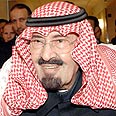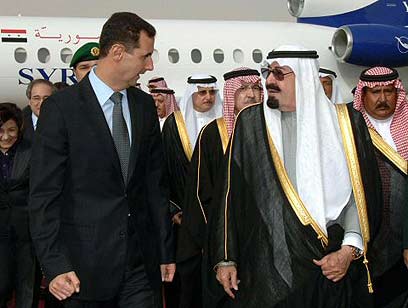
Saudi Arabia, Bahrain, Kuwait pull ambassadors from Syria
Rare intervention by powerful Arab leader against Damascus as King Abdullah says events in Syria 'unacceptable'. Meanwhile, Jordan tells Syria - return to dialogue
Later on Monday it was reported that Kuwait's Foreign Minister Sheikh Mohammed al-Salem al-Sabah announced that the country has also recalled its ambassador to Syria. He added that Gulf foreign ministers would meet soon to discuss the situation in Syria.
- Receive Ynetnews updates directly to your desktop
"Our ambassador to Syria has been summoned for consultation," Sheikh Mohammed told reporters in parliament.
Riyadh's announcement was the sharpest criticism the oil giant - an absolute monarchy that bans political opposition - has directed against any Arab state since a wave of protests roiled the Middle East and toppled autocrats in Tunisia and Egypt.
The Saudi statement came with all the weight of the king's personal authority, and follows similar statements since Saturday from the Arab League and the Gulf Cooperation Council (GCC).
"What is happening in Syria is not acceptable for Saudi Arabia," he said in a written statement read out on Al Arabiya satellite television.

Better days - King Abdullah with Assad (Reuters)
Events in Syria had "nothing to do with religion, or values, or ethics," the king said.
Also Monday, Bahrain followed suit and announced it too had recalled its ambassador from Damascus.
Bahrain's Foreign Affairs Minister Shaikh Khalid bin Mohammed Al Khalifa confirmed that the move echoed the ones taken by Saudi Arabia and Kuwait.
In Washington, a US State Department official said the king's statement was a strong signal to Syria's President Bashar Assad.
"This is another clear sign that the international community, including Syria's neighbors, are repulsed by the brutal actions of the Syrian government and will continue to stand with the people of Syria," the official said.
Arab League breaks silence
A former US government official with knowledge of the region said the Saudi king likely went public to press concerns that had been conveyed privately.
"I think he did it on his own because the private messages were clearly being ignored," the former official said.
Earlier on Sunday, the Arab League, in a rare response to the escalating bloodshed in Syria, called on authorities there to stop acts of violence against civilians.
Although several Arab states have joined the West in opposing Libya's Muammar Gaddafi, most of the region's rulers have been cautious about criticizing other Arab leaders during the wave of protests this year.
Saudi Arabia had maintained its silence regarding Syria despite deep antagonism over the contest for regional hegemony with Shi'ite Iran, one of Syria's only allies and chief patron of Hezbollah, the Shi'ite militia and political movement to which Saudi Arabia's allies have lost influence in Lebanon.
Meanwhile, Jordan's top diplomat urged Syria to return to dialogue, expressing concern over spiraling bloodshed but stopping short of condemning the Arab neighbor.
Foreign Minister Nasser Judeh was quoted by Jodan's official Petra News Agency on Monday describing the escalation in violence by President Hafez Assad's regime as "disturbing." He urged Damascus to follow through on promised reforms.
AP and news agencies contributed to the report
- Follow Ynetnews on Facebook










